by News Desk | Aug 4, 2012 | London News
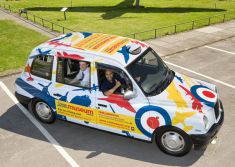 The Royal Air Force Museum London is using taxi advertising for the first time as it aims to promote itself during the London 2012 Olympics.
The Royal Air Force Museum London is using taxi advertising for the first time as it aims to promote itself during the London 2012 Olympics.
London Taxi Advertising was behind the media planning of the campaign, which is set to run for one year, with a competition for the public to tweet the museum at @RAFMUSEUM with images of the cab on the move in London to win a signed mounted print by aviation artist David Bent.
Inside the cab, passengers can access a series of podcasts through QR codes featured on the internal branded taxi tip seats which narrate the histories or aircraft, early pioneers, heroes and heroines in aviation.
Paul Hudson, head of marketing for the Royal Air Force Museum, said: “The London taxi cab is iconic. It is as much as part of our historic city as Buckingham Palace. Its distinct shape is recognised by tourists from across the globe and for many no trip to London is complete without a journey in the back of a cab. What better way is there to promote the Royal Air Force’s London Museum than to have our potential visitors start their experience by interacting with the Museum whilst they are out and about on their travels and at the same time educating them about our location at the birthplace of British aviation, Colindale?”
by News Desk | Aug 4, 2012 | London News
Hotels in London have been forced to cut their prices dramatically after businessmen and tourists were put off staying in the City by the Olympics.
Museums and theatres are also struggling to compete with the Games, with attendances falling by up to a third.
Steve McNamara, the general secretary of the Licensed Taxi Drivers Association, said cab drivers had been hit hard by the lack of trade and described London as a “ghost town”. Transport for London confirmed that traffic was down by a fifth.
The hotel price cuts mean that many rooms in London are now cheaper than they were this time last summer, according to Lastminute.com.
The website said the average room in London booked on a last-minute deal was available for pounds 112 a night compared with pounds 133 last year.
West End traders said business had slumped by as much as 70%, with tourists and Londoners steering clear because of fears about overcrowding.
The Earl of Bradford, the owner of Porters restaurant in Covent Garden, said takings were “disastrous”. “Covent Garden is so quiet when it is normally humming with activity,” he said.
Nica Burns, the chief executive of Nimax Theatres, which owns half a dozen London venues, forecast that ticket sales would be down by 30% over the summer. “For my six theatres, last week was the worst this year. I think the Olympics are great, but I feel like I’ve been the bull’s eye for the archery competition,” she said.
The Association of Leading Visitor Attractions, which represents tourist attractions in London, said attendances over the past two weeks had fallen by about a third.
A spokesman for the British Museum said there had been a fall in the number of visitors of between 25 and 30%.
by News Desk | Aug 4, 2012 | London News
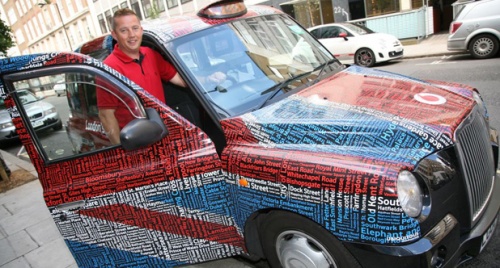
Vodafone have made 1000 taxis available in London which come with built-in mobile chargers which are free to use to customers.
Olympic visitors who may have forgotten their mobile charger will be pleased to hear about the new Vodafone Taxi’s , as well as those doing a lot of browsing while navigating around the capital. The battery-life of current smartphones is always causing the guys at 3G problems and this is a novel solution from Vodafone.
The Vodafone Cabs are pretty easy to spot because they are covered in a huge Union Jack and have a huge Vodafone logo on the side. So if your looking for a cab and want to charge your mobile at the same time then flag one down !
Vodafone have released a new advert to promote the new service which features the Star Wars Master Jedi Yoda. Yoda uses the Vodafone Cab to charge his light-saber which has run out of power due to him taking down way too many Imperial Stormtroopers.
by News Desk | Jul 30, 2012 | UK News
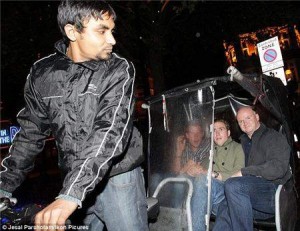 India-style cycle rickshaws are often seen in upmarket areas such as Oxford Street and Regent Street, but their time may be soon up as Scotland Yard uses a 173-year-old law to arrest and fine drivers in central London during the Olympics.
India-style cycle rickshaws are often seen in upmarket areas such as Oxford Street and Regent Street, but their time may be soon up as Scotland Yard uses a 173-year-old law to arrest and fine drivers in central London during the Olympics.
The rickshaw is plied in areas of London, Brighton, Worcestershire, Leicester and Great Yarmouth in east England. They are popular with some commuters due to fares that are lower than taxis, but not everyone is happy.
Taxi drivers are unhappy at losing customers to rickshaws, while others believe the unregulated rickshaw drivers may pose a threat to public safety on roads.
Action has now been initiated against the rickshaw drivers under the Metropolitan Police Act of 1839.
In May, Labour MP John McDonnell tabled an ‘early day motion’ in parliament, calling for a ban on rickshaws during Olympics on the ground that they may obstruct emergency service.
Details released under the Freedom of Information Act to Daily Mail reveals that the Metropolitan Police stopped 534 rickshaw drivers in London in the three-month period between January and March.
Of them, 101 rickshaws were impounded and 53 drivers fined 80 pounds.
The 173-year-old law prevents anyone ‘riding or driving furiously such as to endanger the life or limb of any person’.
The police are cracking down on them as many motorists and pedestrians have reportedly been put in danger by reckless rickshaw drivers.
Chief Superintendent Simon Ovens, who is in charge of policing London’s West End, said: “I would like to see them taken off the road altogether. They put passengers at risk particularly passengers who have had too much to drink and the drivers are unqualified.”
The local council is also acting against the rickshaw drivers.
Councillor Ed Argar, Westminster City Council’s cabinet member for city management and transport, said: “Just a few pedicabs blocking the footway or road or travelling carelessly can have a huge effect on traffic congestion in the busiest part of London and put all road users’ lives in danger.”
During elections to the post of London mayor earlier this year, rickshaws were termed a ‘dangerous menace’, with candidates calling for a law to remove them from West End.
by News Desk | Jul 28, 2012 | London News
 LONDON (Reuters) – Disgruntled London taxi drivers snarled up traffic at one of the city’s busiest traffic hotspots as the minutes ticked down to the Olympics opening ceremony on Friday.
LONDON (Reuters) – Disgruntled London taxi drivers snarled up traffic at one of the city’s busiest traffic hotspots as the minutes ticked down to the Olympics opening ceremony on Friday.
Traffic came to a virtual standstill at Hyde Park corner as “cabbies”, furious at being barred from the Olympic-only traffic lanes on London’s roads, formed a slow-moving convoy around the junction.
Frustrated by the sight of free-flowing Olympic lanes while they sit in jams, the taxi drivers formed up for their go-slow at 2 p.m. after police had earlier told them they were not allowed to protest at the original time of 5 p.m.
According to a BBC traffic report, the vehicles were “stationary” for more than 30 minutes before police cleared the blockage without any reported incidents.
Drivers of the capital’s iconic black taxis are angry to be largely barred from the fast lanes set up to transport athletes, officials and sponsors in a fleet of buses and Olympic-branded BMWs.
Some say they have experienced a 50 percent drop in income since the lanes went into force on Wednesday.
A United Cabbies Group protest around the Houses of Parliament last week brought traffic in the area to a standstill, and on Monday, one driver dived into the River Thames off the historic Tower Bridge.
While police have allowed the protests, they have imposed the condition that none are to start after 4 p.m. local time.
“The Metropolitan police took the decision based on concerns that, if the protest were to go ahead in the time and location specified by the group, it would cause serious disruption to the life of the community,” a police statement said.
A United Cabbies Group spokesman said the Olympic lanes, nicknamed “Zil lanes” after the limousines used by senior officials in the old Soviet Union, undermined the idea of an environmentally friendly Games.
“When most of the athletes are in the Olympic Village out in Stratford, why did they have to impose lanes on central London?” he said. “There are terrible queues building up on the approach roads to London, with cars belching out fumes. The only way this Games will be green is if they hand out pots of green paint.”
Taxi driver Mark Wilcocks from Woodford Green, east of the City, said he may as well have gone on holiday.
“We don’t feel welcome at the Olympics,” he said.
“The Olympics hasn’t embraced the London cabbies. We feel nudged out by VIPs and corporate sponsors.
“They even used the symbol of the black taxi as an image of London in the build-up but we feel unwanted.”
He added that every London taxi is wheelchair-accessible but Paralympians arriving next month might not be able to make use of them if the lanes remain in place.
Unauthorised drivers face a 130-pound fine for driving in an Olympic lane. (Reporting by Martyn Herman; Editing by Sonya Hepinstall)
 The Royal Air Force Museum London is using taxi advertising for the first time as it aims to promote itself during the London 2012 Olympics.
The Royal Air Force Museum London is using taxi advertising for the first time as it aims to promote itself during the London 2012 Olympics.




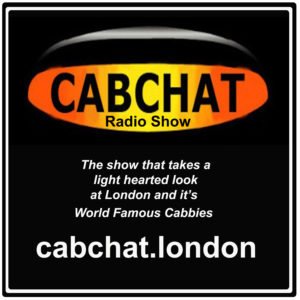
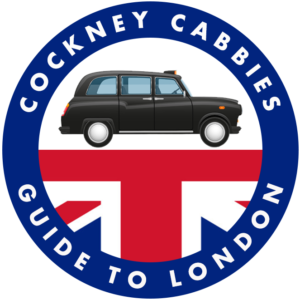

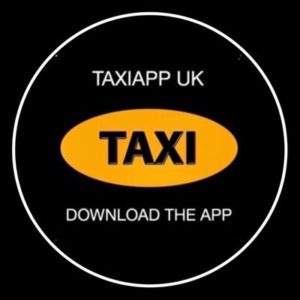

Recent Comments